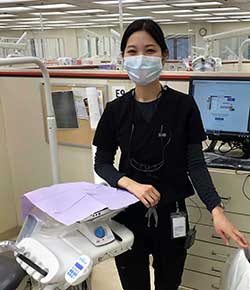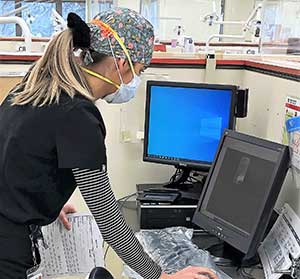 Will this be a permanent home for the Shoreline Community College Dental Hygiene Program?
Will this be a permanent home for the Shoreline Community College Dental Hygiene Program?
Yes. The dental hygiene clinic at Shoreline will close on June 14, 2021 and the Shoreline Dental Hygiene program will move permanently to the UW School of Dentistry.
Is this a UW School of Dentistry (UWSOD) hygiene program or a Shoreline Community College program?
The two-year dental hygiene program, whose length will not change, remains a degree option through Shoreline Community College. The students are Shoreline’s, as are the faculty and staff. CODA accreditation for the program remains with Shoreline, although UWSOD is the site listed with CODA.
How big is the current hygiene program?
Historically, the Shoreline program has admitted 24 students each year. We have reduced that number for the next two years while the program has time to fully integrate into the UWSOD and so that the UWSOD can renovate existing clinical facilities to accommodate the larger class size. We expect to return to 24 students in the class entering in 2023.
How big will the dental hygiene program be in the future? Is there a commitment to increase the class size beyond the original 24?
At this time, there is a serious shortage of dental hygienists in Washington state and the nation. That situation is not expected to improve in the near future, so we intend to increase the class size as our D-1 Simulation Clinic and other clinical facilities are renovated and expanded and as permitted by CODA. We will work with the state dental and dental hygiene associations to continue monitoring the state’s dental hygiene workforce needs.
 Are dental hygiene tuition increases expected with this move?
Are dental hygiene tuition increases expected with this move?
At this time, the Office of the Governor has not determined tuition for the state community college system. The decision should be determined at the end of this biennial legislative session. Because of COVID-related economic challenges, it is unlikely that the state will increase tuition for this or other community college programs. However, for dental hygiene programs, there are clinical and technology fees as well as instrument costs, in addition to tuition. We are working to implement a system where instruments are owned by the program and students pay a leasing fee. This would eliminate a substantial up-front cost for items that students often do not need after they graduate. We also plan to implement this model for the dental students as it is increasingly common in U.S. dental schools. This will reduce the overall cost of the programs.
What must be done to boost enrollment past 24 students per class?
Shoreline and the UWSOD must separately seek approval from CODA to increase the class sizes. Growth is also constrained by the limits of current UWSOD clinical facilities. This is why the fund-raising campaign is so critical. The predoctoral clinics must be significantly expanded and upgraded to accommodate a larger dental hygiene cohort, and the D-1 Simulation clinic must also be reconfigured. Dental education is the most expensive education at both the University of Washington and Shoreline Community College. Growth would also be constrained if there are reductions in state funding needed to operate the dental hygiene program.
What are the advantages of this collaborative program?
This partnership will allow us to continue to provide Shoreline and UWSOD patients with the quality, patient-centered, cost-effective care they have always received, while expanding the services available for Shoreline patients to include full, comprehensive dental care. The partnership also offers opportunities for dental students and dental hygiene students to work collaboratively in the way they will after graduation. Also, this partnership offers dental hygiene students additional opportunities to expand their skills and expertise by working with dental students practicing all procedures that dental hygienists can perform in the state.
Patients who need additional dental care, such as dentures, root canals, extractions, or other treatment, will have several options for receiving it. They can be treated in the dental student clinics, where care is expertly supervised and provided at very low cost. They could also be seen in one of the several UWSOD specialty clinics. Another option is to be seen in the dental school’s Campus Dental Center faculty practice, which is similar to being treated in any private practice.
Exactly what will the matching funds be used for?
The renovations now planned will allow the UWSOD to make better use of existing clinical and simulation lab space so that dental hygiene student capacity can be increased. This will position the school to be prepared to increase the dental hygiene class size beyond 24 per year.
How much money is needed for the dental hygiene-related renovations?
The clinical and simulation lab renovations related to the dental hygiene program are planned in two phases. Phase 1 has already started and will add 12 new operatories in the B350 space as well as 12 simulation stations on the first floor. The total cost for Phase 1 is estimated at $3,484,400. Phase 2 will start as Phase 1 is being completed and will renovate and add operatories on the third floor, impacting 38 operatories (replacing some old and adding some new). Phase 2 will also begin revising the arrangement of the current D1 Simulation Clinic so that we will be able to increase the dental hygiene class size. The total cost for Phase 2 is estimated to be $3,191,000. The total for both phases is estimated at $6,675,400.
What funding has already been secured?
- Delta Dental of Washington has made a $1 million gift and also a $500,000 challenge grant, which is the basis for this campaign.
- Shoreline Community College has contributed $1.55 million and is also donating its dental hygiene program’s equipment to the UWSOD. This includes dental chairs, autoclaves, and radiology equipment.
- The UWSOD has earmarked $1.8 million from its current Campaign for Clinics for the dental hygiene expansion.
- The UW Central Capital Committee has contributed $550,000, and another $500,000 is requested for fiscal year 2022.
- The Washington State Dental Association Foundation has contributed $125,000, and the Seattle-King County Dental Society is considering a challenge to match this amount.
What are the naming opportunities for donations made to this challenge grant campaign?
A $25,000 donation will secure naming rights for an operatory. Additional naming opportunities will be available to individuals, associations, and dental societies at larger donation levels. For more information, contact Randy Newquist at randyn@uw.edu or 360-471-5648 at UW Dentistry Advancement.